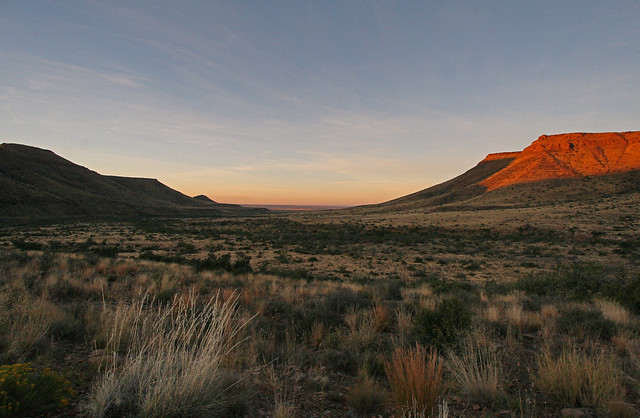A South African government plan to allow fracking in the vast Karoo semi-desert has been condemned as “completely irresponsible” by environmental campaigners, who have vowed to fight it in court.
 Photo by Wildlife Wanderer/Flickr
Photo by Wildlife Wanderer/Flickr
The name Karoo derives from a San phrase meaning Land of the Great Thirst. The region is bigger than Germany at more than 154,500 square miles and has been celebrated by poets for its bleak beauty.
The Karoo, the name derives from a San phrase meaning Land of the Great Thirst‚ is bigger than Germany at more than 154,500 square miles. It contains about 100 towns and a million people and has been celebrated by poets for its bleak beauty. But this week Kgalema Motlanthe, South Africa‘s deputy president, announced in parliament that scientists had advised the government to allow fracking for the benefit of the economy.
On Thursday Rob Davies, the trade and industry minister, said the cabinet had agreed that the exploration of shale gas in the Karoo in Western Cape province should start before next year’s general election. “A potential game-changer is shale gas,” he said.
“My little knowledge of this is that Mossgas [the world’s first gas-to-liquid refinery at Mossel Bay in Western Cape] has a resource of one trillion cubic meters of gas. The gas fields of northern Mozambique, which have just opened, have got about a hundred trillion cubic meters of gas.
“The shale gas deposit estimates suggest that it is multiples of the Mozambique level. If that is the case, this could be a very significant game-changer in terms of the energy situation in South Africa.”
As in Britain and America, plans to allow drilling for shale gas are fiercely controversial in South Africa, where Shell is among companies that have applied for exploration rights. Lobby groups claim that the technique degrades the land, pollutes ground water and fouls the air. They also say fracking could ruin the Karoo, a precious natural asset spanning 40% of the country’s landmass and dating back hundreds of millions of years.
Davies promised that the government would consider the concerns raised by anti-fracking groups. “Of course we are not going to do this in any kind of irresponsible way,” he said. “We obviously have to bear in mind all the environmental implications including, of course, the nature of the relationships with any company that gets any kind of permit, what is going to be the delivery in terms of any positive impact on the economy.”
South Africa is in a constant race to keep up with energy demands. The governing African National Congress (ANC) has brought electricity to millions who were denied it under racial apartheid, but the strain on the national grid, which relies mostly on coal, has led to warnings of more power cuts this year. With the mining sector struggling as a result of labor unrest and falling commodity prices, there is pressure to find new energy sources to boost sluggish economic growth.
In a study of 32 countries, the US Energy Information Administration found that South Africa has the fifth biggest reserves of potentially recoverable shale gas with 485 trillion cubic feet. But activists argue that fracking is not the way to harvest this.
Jonathan Deal, the chairman of the Treasure Karoo Action Group (TKAG), criticized Davies for short-term thinking on complex environmental issues.
“Firstly, we believe that such a decision will have an impact which will endure far beyond the election cycle of the government,” he said. “This decision cannot be rushed through before next year’s election. It will be completely irresponsible.
“Secondly, [mining] minister [Susan] Shabangu has promised on various occasions to consult with the public of this country prior to making any decision on shale gas mining. This has not happened, and the people of South Africa at all levels are entitled to be heard on an issue of this magnitude.”
Julius Kleynhans, the head of environmental affairs at AfriForum, a lobby group that has formed an alliance with TKAG, said: “Government is selling votes with this move, but it is an empty promise. Even if government issues the licenses, exploration cannot legally proceed. We will not allow our constitutional rights to be breached; the alliance will appeal against government. These court cases will take a long time.”
We don’t have a paywall because, as a nonprofit publication, our mission is to inform, educate and inspire action to protect our living world. Which is why we rely on readers like you for support. If you believe in the work we do, please consider making a tax-deductible year-end donation to our Green Journalism Fund.
Donate